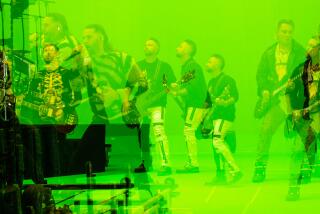Secrecy Increases Allure of Jobs’ Next Computer Venture
- Share via
A few weeks ago, personal computer analyst Stewart Alsop asked an audience of more than 250 top-ranking computer executives who among them had gotten an advance peek at the new computer under development at Steven Jobs’ company, Next Inc.
Just one hand shot into the air, and Alsop enjoyed a hearty laugh.
“The next time someone tells you he knows what’s in the Next computer, beware,” Alsop warned. “It may only be cocktail party chatter. Very few people know what this machine has.” Indeed, the workings of the Next computer--a powerful desktop system that will be unveiled this morning at a jam-packed, 3,000-seat San Francisco symphony hall--are widely considered to be the best-kept secret the usually leak-riddled computer industry has ever had.
Despite the secrecy--or, more likely, because of it--the attention the Next machine has attracted has been awesome. The celebrity status of Jobs, who founded Next three years ago after being deposed as Apple Computer’s chairman, hasn’t hurt either.
“There’s been a tremendous information vacuum and that has created a feeding frenzy for any tidbits,” says Jonathan Seybold, publisher of a computer marketing newsletter. “You know the axiom: If information is hard to get, everyone tries harder to get it.”
According to several individuals close to Next, the secrecy strategy wasn’t devised for that purpose. Rather, these insiders say, the approach was initially adopted to protect the company from nosy competitors anxious to learn about the firm and the machine Jobs promised would revolutionize higher education.
“The only resources this company had were the element of surprise and Steve Jobs’ personal stature,” says Peter Lyman, director of the Center for Scholarly Technology at USC and a member of Next’s technical advisory board. “They had to create a culture of confidentiality.”
Nevertheless, the speculation that emerged was welcome. Many high-tech and marketing experts say it has already served Next well.
“Even if a product is no good, you can get a tremendous amount of attention with secrecy,” says Peter Stranger, president of the Los Angeles office of the ad firm Della Femina, McNamee, WCRS.
But Stranger cautions that few besides the brash Jobs, who was the marketing whiz behind Apple’s Macintosh and Apple II computers, could have inspired the fuss that today’s unveiling has.
Next maintained secrecy with a variety of techniques, most of them well-known within the high-tech industry. What made it different, industry insiders say, was its execution.
Although details--such as the machine’s color (black); its stereo sound quality (“drop-dead” fantastic) and screen (jumbo 17-inch)--have leaked out, its internal workings and Jobs’ marketing strategy have remained closely guarded.
“This is the best-kept secret I have ever seen, and the security is the best I have seen,” says Alsop.
The achievement is considered particularly remarkable because of Jobs’ well-known penchant for spilling the beans.
Alsop recalls that Jobs earned a reputation as a “master of controlled leaking” during the introduction of the Apple II and the Macintosh.
Still others recall that Apple, under Jobs’ leadership was frequently called “the only ship that leaks from the top.”
“It must have been murder for Jobs and his guys to stay quiet for three years,” says Tim Bajarin, executive vice president of Creative Strategies Research International, a Silicon Valley market analysis firm.
The relatively small size of Next’s staff--it still numbers fewer than 150 employees--is one important reason the company was able to keep its secrets under wraps for so long. But there were other equally important factors.
According to Lyman and others, many employees were hired by Next without seeing beforehand what they actually would be working on, a tactic that limited the amount of information leaving the building.
Other insiders say Next may have kept its work force quiet by dangling lucrative stock options in front of those who pleased their bosses by, among other things, keeping their lips sealed.
Saw Different Stages
Although workers can be silenced, high-tech companies typically face a myriad of other potential leaks from the dozens of engineers, programmers and other advisers who routinely are given advance peeks at the product throughout its development cycle.
Like other computer companies, Next required all those granted advance access to sign detailed “non-disclosure” statements binding them to keep absolutely quiet about what they saw and were told about the machine.
But unlike the rest of the industry, Next officials carefully limited the number of people who were granted access and then limited what even they could see.
“Some people saw things others didn’t,” says Thomas Newdecker, assistant vice president for academic affairs at Carnegie-Mellon Institute in Pittsburgh, one of the early investors in Next. “Some saw it at different stages of development.”
Further, Seybold reports that most of the early access was only granted within the past three or four months.
Incomplete Control
Finally, Newdecker says that most of the advance peeks were granted only at Next’s corporate headquarters in Palo Alto and under the watchful eyes of company employees.
“It’s not like there was the machine sitting in some ‘sneak room’ on campus or at a company” Newdecker says, referring to the locked rooms companies and universities often use to test unreleased computer equipment. “Even if it’s under lock and key, the company never has complete control.”
Even those who have signed non-disclosure agreements say they can’t be sure they know all there is about the Next machine.
Lyman, the USC official, is convinced that he hasn’t seen everything. “I’m on the advisory board and I’m convinced I haven’t seen everything,” he says. “There’s something on the ‘mother board’ (main control panel) that’s intrigued me and I haven’t heard a thing about. So I have to go to the unveiling just like everyone else.”





